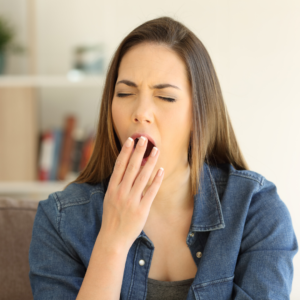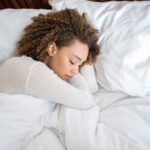,Are you tired of waking up more tired than when you went to bed? Does it seem like a good night’s sleep is more elusive than your half-remembered dreams? The 8 hours a night seems almost impossible without assistance.
In these unusual times it seems that more of us are sleeping less (and exercising too). But if you are woman, it’s often the norm that we find it hard to sleep.
According to the recent Menopause Zeitgeist survey of over 6000 women (Gennev 2019), 78% of women going through perimenopause experience sleep disturbance other than night sweats and 58% of them claim it has a moderate to very high impact on their lives. Many women come to me for help and support when they reach the age of menopause and have long stretches where they’re wide awake.
And the statistics from the 2018/19 Great British Sleeping Habits survey show that women on average only get 6.41 hours of sleep, 19% of women have taken medication to help them fall asleep compared to 15% of men and that women are twice as likely as men to take over-the-counter remedies. And all this while women need an extra 20 of a sleep a night compared to their male counterparts.
From our 40’s onwards, our estrogen and progesterone levels take a nosedive. Because of these changes, many women struggle to relax, unwind, and therefore sleep. But can you blame all on your changing sex hormones? If you’ve been having a tough time falling or staying asleep?
There’s a long list of things that we’re told stop us from sleeping well. Here are five key reasons that you may be struggling with insomnia as a perimenopausal woman:
- Estrogen Dominance
If you are one of the millions of perimenopausal women who have insomnia, then imbalanced estrogen levels are part of the problem. The drop in progesterone that soothes your nervous system and lessens anxiety, progesterone is your calming hormone; when its levels start to fall, then there is an imbalance with estrogen. This is so-called “estrogen dominance which gives rise to a variety of symptoms including insomnia. Estrogen dominance can prompt hot flashes, which are surges of adrenaline that make you sweat. When this happens, it can take time for adrenaline levels to recede, leaving you staring up into the dark, totally unable to fall back into slumber. - Your Hydration Levels
Sleep dehydrates the body through fluid loss (from breathing) and the absence of any additional fluids throughout the night. Going to bed, dehydrated can disrupt your sleep causing your mouth and nasal passages to become dry, leading to snoring. Insufficient fluids can also lead to leg cramps that may keep you awake. In addition to the frustration of fragmented sleep, being dehydrated during the night can compromise your ability to concentration exacerbate menopausal fatigue and brain fog.
Proper hydration means consuming plenty of non-caffeinated drinks regularly throughout the day. Women need approximately 91 ounces daily from beverages and foods. To prevent waking up during the night to go to the bathroom, spread your fluid intake throughout your day to maximize sleeping throughout the night. - Your Exercise Regime
Women significantly reduce regular exercise during middle-age by up to 40%. According to a number of studies, common barriers for midlife women are lack of time, safety concerns about exercising outdoors, weather, and not having a family member or friend to workout with lack of time is further attributed to multiple responsibilities and roles of women within their households and at work.
2017 Consumer Sleep Survey revealed that lack of exercise impacted the ability to get a good night’s sleep.. The survey revealed a clear connection between working out and sleep quality. Almost half of the respondents admitted to never working out, and only 11% who didn’t work out got sufficient sleep.
Exercise improves sleep duration and quality. And when you exercise is unique to you. Some people find having an intense workout too close to bedtime can make it harder to sleep. Exercising in the morning or early afternoon is the best time for a run or a quick trip to the gym because the daylight helps to sync the body clock. Others may find that the extreme exhaustion from a vigorous workout aids them to fall asleep as soon as they hit the pillow. It is critical to tune into your body and find what works best for you. - Sugar Craving
Next time you catch yourself polishing off a load off cookies before bed, try skipping the snack and getting an early night. A study published in the Journal of the American Heart Association in 2017 revealed a link between sleep deprivation and high-calorie food cravings. And as estrogen levels drop, estrogen or progesterone deficiency often produces increased sugar cravings making our insomnia worse. Throw into the mix that sleep deprivation may suppress the hormones that regulate food intake and tell us we are full and satisfied. If you give in to these cravings and eat more sugar, you’ll make your symptoms of perimenopause and menopause even worse. It’s critical for women at this age to switch to a plant-based diet low in sugar. To eat nourishing meals regularly spaced throughout the day. If you need a bedtime snack, make it light and easy to digest.
- Most importantly your level of CHRONIC STRESS –
This is the elephant in the room, STRESS. Hormones work synergistically in the body, and when they are not in balance, it’s harder to sleep. CHRONIC STRESS and excess cortisol have a domino effect on the body. It interferes with melatonin production, so you find it harder to sleep, and stress can lead to impaired thyroid function. Stress also interferes with the creation of estradiol. An essential form of estrogen leading to classic menopause symptoms including night sweats that add to broken sleep. Women are often incredible pressure at this time in their lives juggling teen kids, aging parents, careers and a long list of should’s. Mindfulness meditation can help you to stay present to all these different demands. And help you to love and care from a place of kindness and gratitude. A little meditation goes a long way. It has been found to improve sleep problems within a few weeks of practicing 10 minutes a day.
Sleep problems may be part of the life change, but the good news is that you don’t have to kiss a good night’s rest goodbye once you hit menopause. By making positive lifestyle changes around nutrition, exercise and stress management, you can get your ZZZ’s back on track



